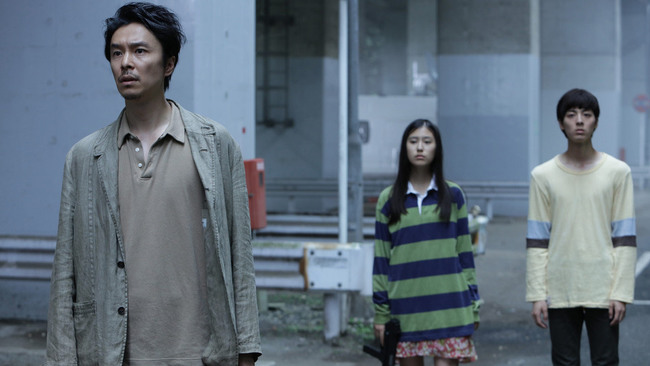NYFF 2017: Kiyoshi Kurosawa’s Before We Vanish

Before We Vanish, which premiered in the Un Certain Regard program at Cannes, screens tonight (Saturday) and tomorrow (October 1) as part of the Main Slate of this year’s New York Film Festival.
“This giddily enjoyable stew of absurdist gore from Japanese filmmaker Kiyoshi Kurosawa begins with an Invasion of the Body Snatchers set-up, in which a handful of normal people seem just a little . . . off.” Flavorwire’s Jason Bailey: “A blowhard journalist stumbles onto the story, when a new source confides, ‘Can you keep a secret? We’re invading Earth.’ He conveys it just that simply, and much of Kurosawa’s humor comes from the bone-dry humor of the interactions . . . It’s so quiet, this movie—deceptively so.”
“The aliens learn about human behavior by stealing peoples’ ‘conceptions,’” explains Keith Uhlich. “They force their victims to focus on a specific idea (say, the concept of ownership), then take it from them with a gentle touch of finger-to-forehead . . . It should surprise no one that the real ‘conception’ in Before We Vanish . . . is love. That’s the one thing that may be able to stop the aliens in their tracks, though it’s to the credit of Kurosawa, who co-adapted the film with Sachiko Tanaka from a play by Tomohiro Maekawa, that he makes that theme resonate with real, aching poignance.”
“This is Kurosawa's funniest work in years,” grants Greg Cwik at Slant, “but he's still focusing on his usual themes. His films inhabit genres the way the aliens inhabit human bodies, using the form of horror, of thriller, to reconnoiter the shadowy terrain of modern life. . . . Shot with a looseness that belies Kurosawa's usual rigor, Before We Vanish elicits a sense of comfort . . . But the rigor of Cure,Pulse, and Bright Future isn't just formal. It's also philosophical, as he depicts cruel, unflinching worlds, manipulative characters, and the violence throughout has an orchestrated, visceral quality. . . . By contrast, the violence in Before We Vanish feels more casual and lacks weight.”
“As recently as Tokyo Sonata, which is now almost a decade old, it seemed as though Kurosawa could sublimate his obsessions with societal decay into any genre,” writes IndieWire’s David Ehrlich. “Then, things got bad. . . . It’s rumored that no human has ever made it to the end of 2015’s Journey to the Shore, and 2016’s Daguerreotype.” Before We Vanish “is every bit as bloated as his last few, but its charms remind us of his great potential (and potential greatness).”
“Eventually,” writes Jordan Ruimy at the Playlist, “Kurosawa lets all hell break loose in the finale, which pits every possible alien invasion battle cliche into a colorful and entertaining fight sequence. There’s enough guns, drones and bombs to make Roland Emmerich blush in envy. This is when Kichi Takahashi‘s messy editing and Kurosawa’s fluid camerawork prove to be effective. . . . In his attempt to painstakingly try to understand the unanswerable questions that bind humanity together, Kurosawa has made a jumbled mess out of his ideas, but one which is nevertheless fascinating in its mad-cap ambition for answers.”
Earlier this month, I pointed to Mark Schilling’s interview with Kurosawa and his review of Before We Vanish (3.5/5) for the Japan Times.
Updates, 10/5: At Reverse Shot, Justin Stewart finds “a formal adventurousness here typical of Kurosawa, who has seesawed between genres both throughout his career (horror, sci-fi, and dramas like Tokyo Sonata) and within individual films (Doppelganger transitions from a loss-of-identity thriller to a sort of satirical romance). The constant element is a sure-footed aesthetic precision, for which crew members like regular DP Akiko Ashizawa also deserve credit—the elegant framings and subtly disorienting lighting and production design that make Kurosawa films reliably enjoyable on a surface level, even when their takeaway ‘messages’ are a little confused.”
“Kurosawa's done so much wonky experimenting in the last few years that it shouldn't have been a surprise that he remade Starman (with a dash of Invasion of the Body Snatchers),” writes Scout Tafoya at RogerEbert.com, “but it's still very odd indeed to see him working so heartfelt a register, especially because he hasn't curbed any of his famous violence for the sake of finding a bigger audience. Yes, it's the peculiarly heartwarming tale of a man who becomes a better partner thanks to an alien invasion, but it also has an enormous body count and a dimly optimistic view of humanity.”
Update, 10/14: “Save for his 2012 television mini-series Penance,” writes Christopher Bourne at In Review Online, “and his most recent feature, 2016’s Daguerrotype—which successfully transplanted the director’s style to a French-language setting—Kurosawa’s output this decade has mostly consisted of meandering reiterations of subjects previously explored with far greater skill and precision in his earlier films. Alas, his latest, Before We Vanish, can be squarely placed in just such a category.”
NYFF 2017 Index.For news and items of interest throughout the day, every day, follow @CriterionDaily.



